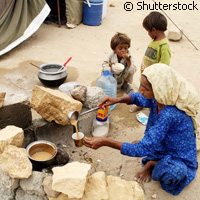Water is food security and economic growth: IWMI report
Hurricanes, landslides, droughts and earthquakes are just some of the latest climatic and weather events impacting our planet. Now comes a new report warning that the swelling number of erratic rainfall events related to climate change is on course to adversely impact food security and economic growth, with Africa and Asia feeling the biggest crunch of all. The International Water Management Institute (IWMI) in Sri Lanka identifies a key action that could help stop the problem in its tracks, and fuel rainfed farming output: boost investment in diverse forms of water storage. 'Millions of farmers in communities dependent on rainfed agriculture are at risk from decreasing and erratic availability of water,' explained Colin Chartres, Director General of IWMI. 'Climate change will hit these people hard, so we have to invest heavily and quickly in adaptation.' Some actions, including the development of big dams, offer fast relief but are not entirely viable for long-term sustainability. Despite their ability to control floods and improve agricultural productivity, these large dams create problems in the social and environmental areas. The IWMI explains that up to 80 million people are displaced from their homes, and around 470 million people living downstream from dams are affected from river flow changes. Instead of focusing on such actions, we should target an integrated approach that combines small and large-scale storage options. For example, groundwater from beneath the surface of the Earth, water stored in the soil, and water collected in ponds, reservoirs and tanks could be used to help us deal with problems if and when they emerge. 'Just as modern consumers diversify their financial holdings to reduce risk, smallholder farmers need a wide array of "water accounts" to provide a buffer against climate change impacts,' notes Matthew McCartney from the IWMI and lead author of the report. 'That way, if one water source goes dry, they'll have others to fall back on,' he added. 'For millions of people dependent on rainfed agriculture, reliable access to water can make all the difference between chronic hunger and steady progress toward food security. Even small amounts of stored water, by enabling crops and livestock to survive dry periods, can produce large gains in agricultural productivity and in the well-being of rural people.' According to the IWMI, better agricultural water management could give almost 500 million in Africa and India a huge boost. Rainfed agricultural covers 94% of the total cropped area in sub-Saharan Africa, and 66% in Asia, IWMI says. The problem, however, is that water storage infrastructure is sorely lacking in these areas. 'Unless we can reduce crippling uncertainty in rainfed agriculture through better water storage, many farmers in developing countries will face a losing battle with a more hostile and unpredictable climate,' the IWMI notes. Thinking long and hard and taking secure steps, such as developing and providing greater numbers of small-scale storage options, would give local food security and the economy a huge boost. In a nutshell, solid planning and management are key to success. 'None of these options is a panacea,' Dr McCartney points out. 'They all have pros and cons, which depend on their inherent characteristics, on the way they are planned and managed, and on the conditions at specific sites.' Speaking at 'The Water Challenge' Bled Strategic Forum 2010 in Slovenia on 30 August, European Commissioner for Environment Janez Potocnik said the 'great acceleration' of the 20th century saw 4-fold growth in the planet's population and 40-fold growth in economic output. However, we also succeeded in increasing our use of fossil fuels 16 times and water 9 times. Commissioner Potocnik noted how water is one of our greatest challenges. 'Just ask any of the millions of Pakistanis, fighting for their lives because of floods and flood-related diseases,' he underlined. 'Stakeholders throughout the world know how important it is that we meet the challenge head on.' The Millennium Development Goals (MDGs) and the World Summit on Sustainable Development (WSSD), therefore, is working to ensure a 50% drop in the proportion of people without sustainable access to potable water and basic sanitation. The European Commission, for its part, has introduced the EU Water Initiative, which integrates water resource management through a 'river basin approach'. With almost EUR 1.5 billion in water project funding, the Initiative brings together groups and people from myriad sectors to secure better governance in the water sector and attract greater regional investment. The upshot will be stronger regional cooperation, as well as more efficient financial mechanisms for funding development programmes.
Countries
Sri Lanka, Pakistan, Slovenia



